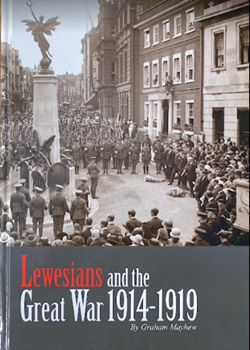Lewesians in the Great War by Graham Mayhew
- Home
- World War I Book Reviews
- Lewesians in the Great War by Graham Mayhew

First and foremost, I should state that I have a personal interest in this book. 'Lewesians in the Great War', written by fellow Lewes Town Councillor and former Mayor Dr. Graham Mayhew. The project was brought to the attention of the Lewes Town Council Grants Committee meeting, and I argued in favour of supporting the project well in the hopes of producing something of lasting quality, in a hardback edition with photographic illustrations throughout. I then gave a few examples of war memorial books like this, which were about the lives and deaths of men (for the most part) who had served and died during the First World War. I collect these books in their various forms, from a leaflet produced to remember a few names of First World War dead in a chapel in a hamlet to a thick hardback book about a city or town. I review them here, and also post stories to 'On This Day' where we remember someone who died each day of the year.
Graham Mayhew attended York University where he studied history. He then went on to teach history for 33 years at the University of Sussex's Centre for Continuing Education and for 29 years at the Open University. He is a member of the Royal Historical Society. During the Great War centenary period of 2014-2018/19, he wrote regularly for The Sussex Express, and six of his articles are now available on this website; simply search 'Graham Mayhew' or follow the Article Tag 'Graham Mayhew' for these.
'Lewesians in the Great War 1914-1919' covers a lot of ground and is written well. The introduction is based on a talk Graham gave on the topic of Lewes before the War in the Council Chamber of the Town Hall that was full of photos from Edward Reeves & Son, a photography studio that opened in the town in 1858 and is open to this day. Some of these photographs are featured in the book, courtesy of the current Reeves generation, who still run the photographic shop. The book's raison d'être was to complete the list of those who should be remembered on the iconic town's memorial, which, as so often happens in this country, left more than a few names off for one reason or another. The larger historical context is established with a concise account of the events leading up to World War I. More succinct accounts of major events, battles, and figures serve as landmarks throughout the book as we learn the stories of those who enlisted and later died while serving their country.
'Lewesians in the Great War' provides a compelling glimpse into the lives of those who left their homes to serve their country. During the centenary years, a map was created identifying where Lewesians had been living, and most poignantly, a torchlight vigil was held in the town, with young men and fathers walking from these homes to the site of the Lewes War Memorial, where the names of those who died were read out.
Graham's attention to detail is one of the book's most notable characteristics. The meticulous research and collection of primary sources result in a vivid and authentic portrayal of life at the time. The author delves into personal stories, letters, and diaries to provide a multifaceted perspective on not only the military involvement but also the impact of the war on the community. This approach humanises the story, making it more relatable and emotionally engaging.
The book provides a comprehensive overview of life in Lewes during the war. From the initial patriotic fervour and rush to enlist, to the devastating toll of casualties and the tireless efforts of the home front, the author covers a wide range of topics. The chapters are well-organised, guiding the reader through the timeline of events while maintaining a consistent narrative flow. The use of maps, photographs, and illustrations enhances the reading experience by providing visual context for the stories being told.
One of the book's strongest points is how it depicts the human spirit in difficult times. Graham does an excellent job of demonstrating how bravery, resilience, and friendship grew in the face of war's horrors. The book shows how determined and selfless the people of Lewes were through personal stories and accounts, making you feel proud and inspired.
Finally, Graham Mayhew brings the experiences of the people of Lewes to life through careful research and interesting stories, making a valuable contribution to our understanding of how the First World War affected the town. This book is a rich and thought-provoking read for anyone interested in the history of World War I, particularly those who want to learn more about a person through their life story. It is recommended for those interested in family history and those considering a similar project, and it should be treasured by our community here in Lewes, with copies available at the town hall, library, and schools.
Review by Jonathan Vernon
Jonathan Vernon is the Digital Editor of The Western Front Association. His MA dissertation, ‘The Friendly Invasion of Lewes, September 1914’ concerns the events surrounding the billeting of 10,000 recruits on the town and is available on this website.





